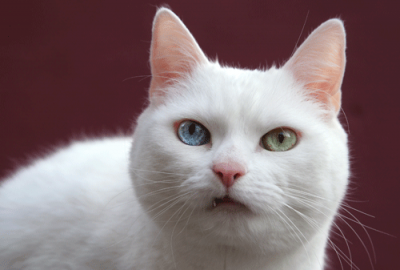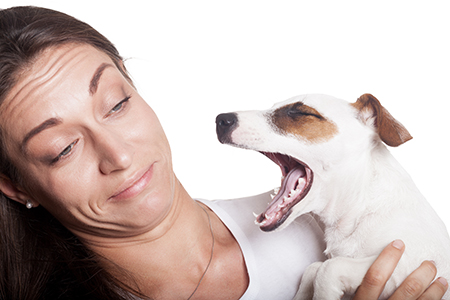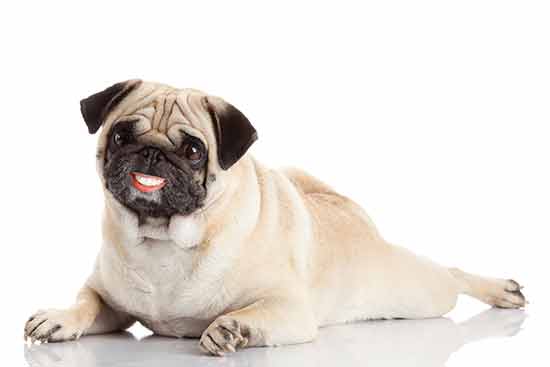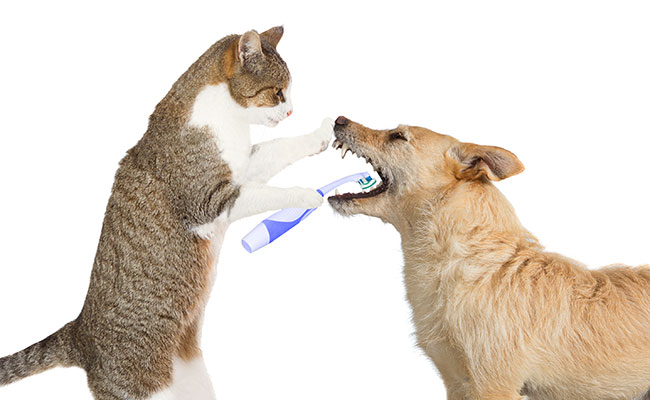 Imagine how your teeth would look and feel if you didn’t brush them daily. The same principles apply to your cat’s teeth. Just like humans, our furry friends require regular dental examinations to stay healthy and happy throughout their lives. Every pet has different needs when it comes to their oral health. Dr. Charles Whitworth and his staff can evaluate your pet’s dental health during a regular wellness exam. Dr. Whitworth will take a look at the quality of your cat’s teeth, gums and other soft tissues of the mouth. He will look for signs of plaque and tartar as well as potential tooth decay or gingivitis. If your pet has only mild symptoms, he will offer advice on how to care for their teeth at home. If more serious problems are detected, he may suggest a full dental cleaning.
Imagine how your teeth would look and feel if you didn’t brush them daily. The same principles apply to your cat’s teeth. Just like humans, our furry friends require regular dental examinations to stay healthy and happy throughout their lives. Every pet has different needs when it comes to their oral health. Dr. Charles Whitworth and his staff can evaluate your pet’s dental health during a regular wellness exam. Dr. Whitworth will take a look at the quality of your cat’s teeth, gums and other soft tissues of the mouth. He will look for signs of plaque and tartar as well as potential tooth decay or gingivitis. If your pet has only mild symptoms, he will offer advice on how to care for their teeth at home. If more serious problems are detected, he may suggest a full dental cleaning.
Dr. Whitworth knows that dental disease can be associated with other serious health problems, such as heart and kidney disease. Prevention of disease through regular oral exams is the first step toward enhancing health and extending the life of your cat.
Dental Cleanings
The experts at Whitworth Animal Clinic perform dental cleanings using anesthetic and non-anesthetic dentistry options. Some cats are not candidates for anesthesia due to a variety of health risks. Dr. Whitworth will discuss your pet’s specific situation to find the solution that works best for you and your family. He may request pre-anesthetic blood work to ensure that your cat is healthy enough to receive an anesthetic. From there, he can tailor the anesthetic to your pet and carefully monitor their vital signs throughout. At the end of the procedure, Dr. Whitworth’s team will care for them until they’re awake, moving, and generally feeling back to normal.
Severe Oral Conditions
Pets may not demonstrate pain in an obvious way, but sometimes we see behaviors that indicate painful problems in the teeth, mouth, or jaw. Broken teeth, mouth sores, or oral tumors are often difficult to identify by pet owners, but are revealed in behaviors such as pawing at the face, drooling, or difficulty eating. Some of the most common oral conditions include the following:
- Periodontal Disease: buildup of plaque and tartar on the teeth.
- Stomatitis: severe inflammation or ulceration of the tissues lining the oral cavity resulting in surgical removal of the affected tissues and tooth extractions using dental X-rays to confirm complete removal of the roots.
- Tooth Resorption: Feline tooth resorption is a common and underdiagnosed condition, affecting up to three-quarters of cats over the age of 5. The tooth consists of both bony material (dentin and enamel) and the soft tissues of the tooth root, which includes blood vessels and nerves. For reasons still not fully understood, the body starts to resorb the dentin, loosening the tooth and causing painful exposure of the root.
- Bad Breath: Halitosis is the result of multiple different problems in the oral cavity, from simple periodontal disease to an infected mass. Bad breath may also be the result of a systemic illness such as diabetes or kidney disease. Halitosis is always worth mentioning to Dr. Whitworth, but when it is accompanied by signs such as changes in appetite, difficulty swallowing, vomiting, or diarrhea, you should call right away for a check-up. It may be the only sign of a more serious underlying problem, and the sooner it is addressed, the better.
- Infection: Infections in the oral cavity can occur secondary to trauma, foreign bodies in the mouth, immunosuppression, or conditions such as tooth resorption. A generalized infection of the gingival tissue will result in swelling and redness, while a localized accumulation of infection and pus can result in an abscess. Tooth root abscesses result in pain and swelling in the jaw, quickly spreading to surrounding tissues. In addition to appetite changes, cats may paw at their faces due to the discomfort.
- Malocclusions: Malocclusion occurs when the teeth are in abnormal positions, which prevents the mouth from being comfortably closed. This may lead to pain and trauma to the gingival tissues as the teeth bite into the sensitive gums, and predispose a cat to periodontal disease. Malocclusions may be present from birth or occur secondary to trauma.
Ongoing Feline Oral Care
Regular cleanings are a great way to both stop current decay and prevent any additional occurrences. You may also want to consult with Dr. Whitworth regarding special food, treats or other dental products that may promote oral health. If your cat has had teeth removed as a result of tooth decay, the prognosis remains good. Cats can live full and regular lives even if missing several teeth. In the case of a cat having a large number of teeth removed, you may have to alter your cat’s diet to provide foods that are easier to chew.
Dr. Whitworth and his veterinary staff recommend annual dental checkups and cleaning. Ask us about wellness and procedures that you can do yourself to ensure your pet’s health. Make an appointment at Whitworth Animal Clinic in Madison, Alabama, to have your pet’s teeth checked.






Leave A Comment